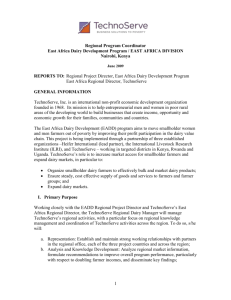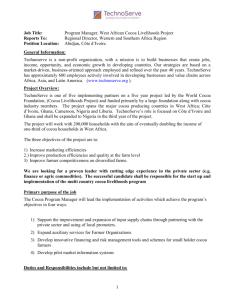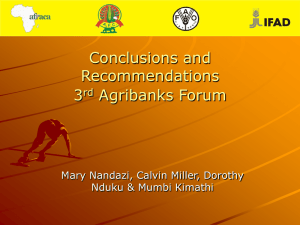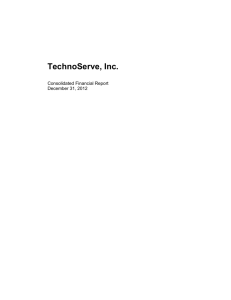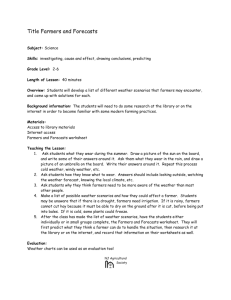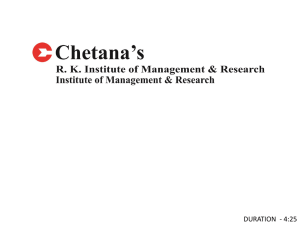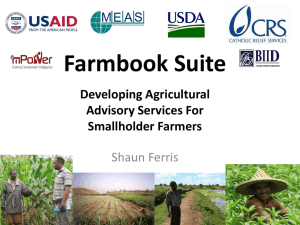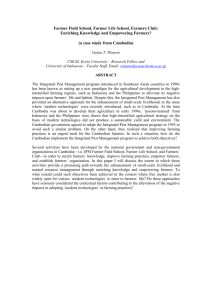Summer 2013 - TechnoServe
advertisement
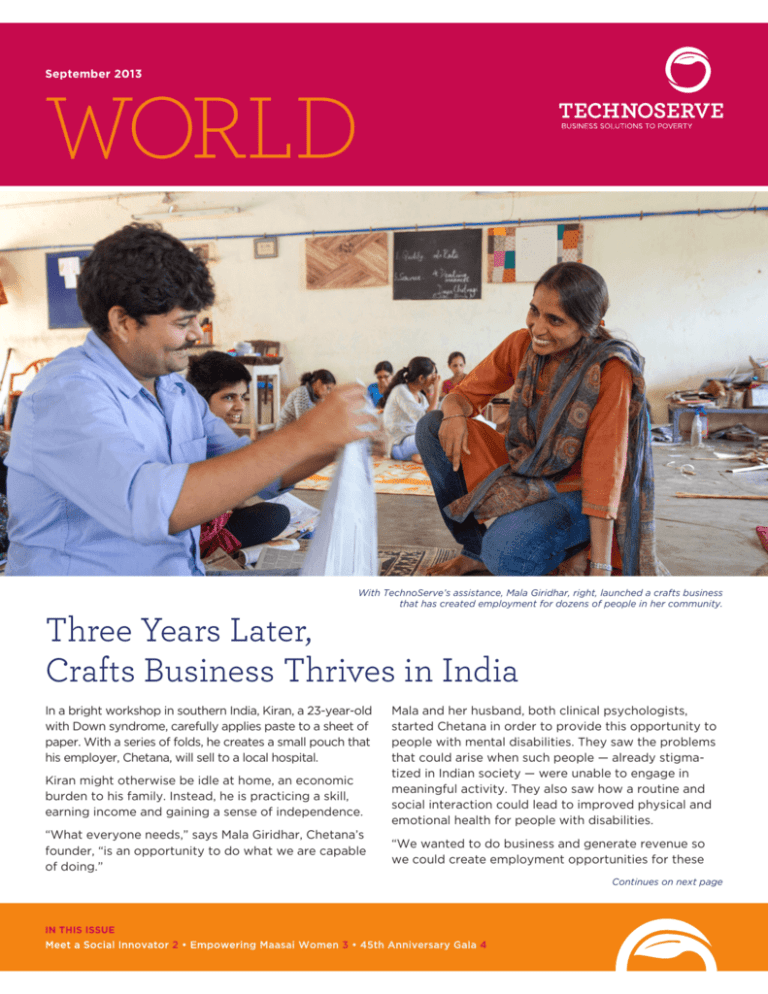
September 2013 WORLD With TechnoServe’s assistance, Mala Giridhar, right, launched a crafts business that has created employment for dozens of people in her community. Three Years Later, Crafts Business Thrives in India In a bright workshop in southern India, Kiran, a 23-year-old with Down syndrome, carefully applies paste to a sheet of paper. With a series of folds, he creates a small pouch that his employer, Chetana, will sell to a local hospital. Kiran might otherwise be idle at home, an economic burden to his family. Instead, he is practicing a skill, earning income and gaining a sense of independence. “What everyone needs,” says Mala Giridhar, Chetana’s founder, “is an opportunity to do what we are capable of doing.” Mala and her husband, both clinical psychologists, started Chetana in order to provide this opportunity to people with mental disabilities. They saw the problems that could arise when such people — already stigmatized in Indian society — were unable to engage in meaningful activity. They also saw how a routine and social interaction could lead to improved physical and emotional health for people with disabilities. “We wanted to do business and generate revenue so we could create employment opportunities for these Continues on next page IN THIS ISSUE Meet a Social Innovator 2 • Empowering Maasai Women 3 • 45th Anniversary Gala 4 homes. Mala runs the business collectively with four trainers and two managers. From its initial offerings of paper packets and pens, Chetana has expanded to produce a range of crafts made from recycled banana fiber. Its products are sold in stores in major Indian cities. Kiran, a young employee with Down syndrome, creates paper products in Chetana’s workshop. people,” Mala says. “But we didn’t know how.” In 2009, soon after launching Chetana, Mala entered a TechnoServe business plan competition that aimed to support promising social enterprises. Together with more than 20 other entrepreneurs, Mala received 200 hours of training on business fundamentals. “The concepts were clarified beautifully,” Mala says. “That training program definitely gave me an idea about the different aspects of a business, right from conceptualizing the idea up to generating revenue. Everything was covered in detail.” Following the training program, the entrepreneurs presented their business plans to a panel of judges. Mala was selected as one of five winners and received $5,000 in seed capital. She invested in a new workshop and set about putting her business plan into action. A visit to Chetana today demonstrates the impact of TechnoServe’s assistance. Nearly three years after the business plan competition ended, Chetana employs 20 people in the workshop and an additional 40 women who work from their Mala says she has internalized many of the things she learned from TechnoServe’s trainings. Her vision for Chetana is to provide employment for 100 people, including 50 people with disabilities, within the next four years. Although her main goal is social impact, she recognizes the importance of running Chetana as a business. The excitement of contributing to a competitive business spills over to the employees. Mala says that even she is surprised by the growth she has witnessed in people like Kiran. “Today, they share the thrill of a new product,” Mala says. “They share the completion of a big order. We go out together and celebrate when we have passed certain milestones. And then, there is no limit to their growth. They become part of something much bigger.” • Visit technoserve.org/chetana to watch a video about the business. FROM THE FIELD TechnoServe Employee Wins Rockefeller Foundation Fellowship TechnoServe’s staff is globally recognized for its expertise, commitment and innovation. Recently, Joan Leteipa, our Kenya-based program manager for the Connected Farmer Alliance, was named an inaugural Fellow for the 2013 Rockefeller Foundation Fellowship Program in Social Innovation. The Fellowship Program brings together a diverse group of 18 leaders who are committed to developing solutions to address the roots of problems affecting poor people. Joan has worked on five TechnoServe initiatives since 2006, when she joined as a business advisor for the Young Women in Enterprise program. “It has been a learning curve all the way,” she says. Her current focus on the Connected Farmer Alliance is to help “kick-start the next wave of mobile solutions for agricultural growth.” The Connected Farmer Alliance is a partnership between Vodafone, the U.S. Agency for International Development and TechnoServe that seeks to increase productivity and incomes for smallholder farmers across Kenya, Tanzania and Mozambique. The program is exploring the design and implementation of mobile phone applications that improve supply chain efficiency and increase farmers’ ability to access information and financial services. “TechnoServe has a unique opportunity to inform the market on farmers’ needs, as well as facilitate development of mobile solutions that respond to the real needs of the smallholder farmer,” Joan says. • 2 WORLD • SEPTEMBER 2013 ON THE GROUND WEST AFRICA Credit for Cocoa Farmers Cocoa is a critical source of income for smallholder farmers in West Africa. As a partner in the WCF Cocoa Livelihoods Program, a regional initiative led by the World Cocoa Foundation, TechnoServe is helping farmers in Côte d’Ivoire and Ghana to increase their incomes through access to credit for fertilizers and other inputs that can more than double their yields. In Côte d’Ivoire, TechnoServe’s pioneering risk-sharing mechanism has led to impressive results: borrowing farmers have maintained a 100-percent loan repayment rate over three seasons, even in the face of civil conflict in 2011. Based on this success, TechnoServe and Advans Côte d’Ivoire, a microfinance institution, recently launched a partnership with the web platform Kiva to facilitate loans for inputs to small groups of cocoa farmers. KENYA Empowering Maasai Women In Maasai culture, which revolves around cattle, women traditionally serve as the milk traders of the family and use income from dairy sales to meet daily household Maasai farmer Mereyian Mutunkei, 65, tends to her herd in the early morning hours. needs. TechnoServe is helping to sustainably improve the livelihoods of Maasai women and their households by increasing milk production and access to markets. In 2011, TechnoServe helped to establish the first dairy plant in Kenya wholly owned by Maasai women. Situated in Kajiado County, about 50 miles from Nairobi, the Maasai Women Dairy cooperative has grown to more than 3,200 active members, and has increased production from 105 gallons a day two years ago to a peak of 7,130 gallons. The women are receiving training in improved animal husbandry practices, such as rotational grazing systems, as well as natural resource management, including soil and water conservation, renewable energy sources and tree planting. TechnoServe’s work with the Maasai Women Dairy is part of the Agribusiness Development Program, which organizes farmers into dairy business hubs and offers support services to more than 19,000 small-scale dairy farmers. NICARAGUA Higher Incomes from Livestock A new initiative seeks to improve the livelihoods of smallholder livestock producers in Nicaragua while positioning the country’s livestock industry to compete on a global scale. With support from the U.S. Department of Agriculture, TechnoServe is helping 4,000 farmers to increase productivity, strengthen producer organizations and connect to higher-value markets. The Ganadería Empresarial (GANE) program is also improving the industry’s ability to meet stricter international food safety standards by developing the government’s animal health services. GANE aims to generate 1,500 jobs and $14.7 million in new sales per year, creating a more prosperous future for thousands of farming families. • Here to Stay The word “sustainability” means different things to different people. For TechnoServe, sustainability is all about what happens after our work ends. We provide business solutions to poverty by linking people to information, capital and markets. The lasting impact of our work really becomes evident years later. Are farmers still accessing markets and running their farms as a business? Are industries thriving and attracting new participants? Do businesspeople have the vision and skills needed to grow their enterprises? For this newsletter, we visited Mala Giridhar, an entrepreneur who worked with TechnoServe three years ago to get her crafts business off the ground. Today, she’s competing in the marketplace and providing employment opportunities for disabled people. Her business has become an engine of change in her community. It’s Mala’s work that creates sustainable impact — and it’s your support that allows TechnoServe to reach enterprising people like her. Thank you for helping to set this process in motion. Bruce McNamer PRESIDENT AND CEO TECHNOSERVE.ORG 3 OUR SUPPORTERS Our Impact In 2012, TechnoServe’s work benefited 2.9 million people in more than 30 countries by targeting improvements in farms, businesses and industries. HIGHER REVENUES FOR FARMERS 568,300 farmers participated $43.8m increase in farmer revenues $210.9m total farmer revenues HIGHER REVENUES FOR BUSINESSES 1,540 businesses participated $26.6m increase in business revenues $110.4m total business revenues NEW JOBS, HIGHER WAGES 9,330 new jobs $10m increase in wages paid $23.5m total wages paid Learn more in our 2012 Annual Report at technoserve.org/2012AR. CONNECT WITH US In Memoriam: Paul Soros Paul Soros, a successful businessman and philanthropist, died June 15 at age 87. Paul was a member of TechnoServe’s Board of Directors for more than 20 years before retiring last year. He was a longstanding member of the Executive Committee, providing crucial guidance on TechnoServe’s operations and strategic direction. Paul was raised in Hungary and survived the Holocaust era under a false identity. In 1948, he immigrated to the United States. Paul would go on to launch Soros Associates, a world leader in the design and development of port facilities. Together with his wife, he also established the Paul & Daisy Soros Fellowships for New Americans, which provides graduate school fellowships for immigrants to the U.S. As an immigrant and the leader of a global company, Paul had a strong understanding of TechnoServe’s mission. He was an invaluable source of information about conducting business in the developing world. He listened patiently, and invariably offered sound advice. Paul was generous, thoughtful, and a dedicated steward and mentor. We are thankful for his remarkable service to TechnoServe. • 45th Anniversary Gala Join TechnoServe on October 16, 2013 in New York City as we celebrate 45 years of helping hardworking men and women lift themselves and their communities out of poverty. THE HONOREES • • • Tewodros Ashenafi | Chairman & CEO, SouthWest Energy Jerry Baldwin | Director, Peet’s Coffee & Tea Inc. Stephan B. Tanda | Managing Board Member, DSM Visit technoserve.org/gala for more details. Support Our Work You can support our work through direct contributions, by scheduling a recurring donation or by making tribute gifts, bequests, appreciated stock contributions or life income agreements (such as charitable gift annuities, charitable remainder trusts and pooled income funds). To donate, or learn more about ways to give, call 800-99-WORKS or visit donate.technoserve.org. Paul E. Tierney, Jr., Chairman Bruce McNamer, President and CEO 1120 19th Street NW, 8th Floor | Washington, DC 20036 202-785-4515 or 800-999-6757 technoserve@tns.org technoserve.org Since its inception in 1968, TechnoServe’s work to create business solutions to poverty has benefited millions of people in more than 40 countries. TechnoServe is a private, nonsectarian, nonprofit organization, as defined by IRS code section 501(c)(3). TechnoServe is a member of Global Impact. Contributions to TechnoServe are tax deductible to the extent permitted by law.
